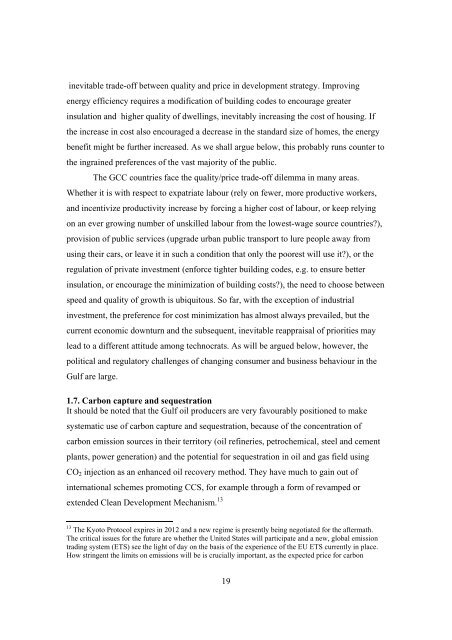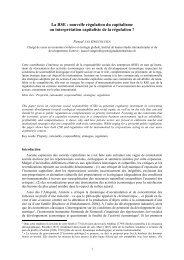PDF - Graduate Institute of International and Development Studies
PDF - Graduate Institute of International and Development Studies
PDF - Graduate Institute of International and Development Studies
Create successful ePaper yourself
Turn your PDF publications into a flip-book with our unique Google optimized e-Paper software.
inevitable trade-<strong>of</strong>f between quality <strong>and</strong> price in development strategy. Improving<br />
energy efficiency requires a modification <strong>of</strong> building codes to encourage greater<br />
insulation <strong>and</strong> higher quality <strong>of</strong> dwellings, inevitably increasing the cost <strong>of</strong> housing. If<br />
the increase in cost also encouraged a decrease in the st<strong>and</strong>ard size <strong>of</strong> homes, the energy<br />
benefit might be further increased. As we shall argue below, this probably runs counter to<br />
the ingrained preferences <strong>of</strong> the vast majority <strong>of</strong> the public.<br />
The GCC countries face the quality/price trade-<strong>of</strong>f dilemma in many areas.<br />
Whether it is with respect to expatriate labour (rely on fewer, more productive workers,<br />
<strong>and</strong> incentivize productivity increase by forcing a higher cost <strong>of</strong> labour, or keep relying<br />
on an ever growing number <strong>of</strong> unskilled labour from the lowest-wage source countries?),<br />
provision <strong>of</strong> public services (upgrade urban public transport to lure people away from<br />
using their cars, or leave it in such a condition that only the poorest will use it?), or the<br />
regulation <strong>of</strong> private investment (enforce tighter building codes, e.g. to ensure better<br />
insulation, or encourage the minimization <strong>of</strong> building costs?), the need to choose between<br />
speed <strong>and</strong> quality <strong>of</strong> growth is ubiquitous. So far, with the exception <strong>of</strong> industrial<br />
investment, the preference for cost minimization has almost always prevailed, but the<br />
current economic downturn <strong>and</strong> the subsequent, inevitable reappraisal <strong>of</strong> priorities may<br />
lead to a different attitude among technocrats. As will be argued below, however, the<br />
political <strong>and</strong> regulatory challenges <strong>of</strong> changing consumer <strong>and</strong> business behaviour in the<br />
Gulf are large.<br />
1.7. Carbon capture <strong>and</strong> sequestration<br />
It should be noted that the Gulf oil producers are very favourably positioned to make<br />
systematic use <strong>of</strong> carbon capture <strong>and</strong> sequestration, because <strong>of</strong> the concentration <strong>of</strong><br />
carbon emission sources in their territory (oil refineries, petrochemical, steel <strong>and</strong> cement<br />
plants, power generation) <strong>and</strong> the potential for sequestration in oil <strong>and</strong> gas field using<br />
CO 2 injection as an enhanced oil recovery method. They have much to gain out <strong>of</strong><br />
international schemes promoting CCS, for example through a form <strong>of</strong> revamped or<br />
extended Clean <strong>Development</strong> Mechanism. 13<br />
13 The Kyoto Protocol expires in 2012 <strong>and</strong> a new regime is presently being negotiated for the aftermath.<br />
The critical issues for the future are whether the United States will participate <strong>and</strong> a new, global emission<br />
trading system (ETS) see the light <strong>of</strong> day on the basis <strong>of</strong> the experience <strong>of</strong> the EU ETS currently in place.<br />
How stringent the limits on emissions will be is crucially important, as the expected price for carbon<br />
19




